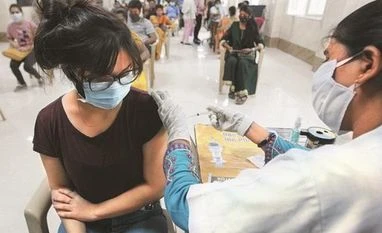India administered a record 8.1 million doses of Covid-19 vaccines on Monday – about 2.5 times the weekly average of 3.2 million shots a day – as the central government-led “free for all” vaccination drive kicked off.
With increased supplies, more centres, and walk-in registrations allowed under the revised guidelines, the vaccination numbers have seen a surge in many states, including Madhya Pradesh, Karnataka, and Uttar Pradesh.
At this pace of daily vaccinations, the entire adult population in the country can be inoculated by December 2021-January 2022, according to estimates. The government is also hopeful of an improved supply situation from July onwards. Three-fourths of the total supplies are now available for the Centre, and the remaining are for the private sector.
Population, disease burden, progress of vaccination, and vaccine wastage are among the main criteria for the allocation of vaccines to states.
Earlier this month, Prime Minister Narendra Modi said his government would buy 75 per cent of all vaccines from manufacturers and distribute them for free to states.
Around 50 million people have already got two doses of the vaccine. Another 170 million people have got one dose. The government will need to administer another 1.63 billion vaccine doses to vaccinate the entire adult population, which is estimated to be around 865 million.
The data on Co-WIN portal showed that the highest number of vaccinations was done in Madhya Pradesh on Monday. The state more than trebled its vaccination rate to over 1.5 million doses from its maximum daily rate of 500,000 doses so far, according to state officials.
Madhya Pradesh had received 1.9 million doses from the Centre for the first day of vaccination under the revised guidelines, as against its demand for 2 million. “The response has been unprecedented...We have also increased the number of centres to 10,000-12000, including drive-throughs, which would remain open till 10 pm,” said Santosh Shukla, state immunisation officer.
The second-highest vaccinations were held in Karnataka, which administered 1.06 million doses in a single day, followed by UttarPradesh, which gave out 674,557 doses on Monday. UP expects to vaccinate 1 million people a day from July 1.
However, West Bengal is among the states that have complained of vaccine shortage. The state is focusing on vaccinating priority groups only till availability improves. West Bengal has the capacity to increase vaccinations to 500,000 a day, but is administering 200,000-300,000 doses a day due to the shortage. “Once we complete the priority groups, we will decide on the 18-plus,” Ajay Chakraborty, director of health services, West Bengal, said. The state administered over 188,000 doses on Monday.
Maharashtra has been giving priority to the 30-44 age group and plans to start vaccinating the 18-plus lot from Tuesday, after a hiatus of several weeks. In Mumbai, the total number of vaccinations for 18 years and above has crossed 1 million, of which 90 per cent has happened through private vaccination sites.
The Delhi government said the Centre’s vaccination campaign was only for advertisements and announcements. “The reality is that Delhi has not been supplied even a single dose today, when a universal campaign was supposed to be launched,” Aam Aadmi Party’s Atishi Marlena said. Delhi has only five days of Covaxin stock and 57 days of Covishield stock.
“The Centre will be making merely 1,519,000 doses available in July. At this speed, Delhi will take more than 13 months to vaccinate its population,” Marlena added.
Experts say that in order to achieve the full vaccination target, coverage has to be improved across the country and not just in some states.
During the month of May, more than 79 million vaccines were available for the nationwide vaccination exercise. These were ramped up to 118 million in June. These include the free supply of vaccines to states from the Centre, as well as those directly procured by the states and private hospitals, the health ministry said.
The revised guidelines require the states to aggregate the demand of private hospitals keeping in view equitable distribution between large and small private hospitals and regional balance.
A small hospital chain, which caters largely for rural areas and smaller towns, said it could not get even a single dose even after it told the state about its demand. “We gave a minimal demand of 100 doses a day when large hospitals are doing so much more, but we have not been able to get any till now. We can go out in villages to vaccinate people but not without any supply,” the owner of the hospital chain said.
Meanwhile, vaccine supplies are set to increase from this month after vaccine makers have scaled up manufacturing. Serum Institute of India (SII), for example, is set to make 100 million Covishield doses from July. The company is likely to manufacture 90 million doses in June, and around 75 per cent of this, or 68 million doses, would go to the Centre.
Bharat Biotech says it is on track to touch 1 billion annual doses, or roughly 80-83 million doses a month, by the October-December quarter this year. The company does not give a break-up of monthly vaccine production now, but industry sources and analysts estimate it is around 40-45 million doses a month now.
(Inputs from Virendra Singh Rawat in Lucknow, Ishita Ayan Dutt in Kolkata, and Vinay Umarji in Ahmedabad)
Unlock 30+ premium stories daily hand-picked by our editors, across devices on browser and app.
Pick your 5 favourite companies, get a daily email with all news updates on them.
Full access to our intuitive epaper - clip, save, share articles from any device; newspaper archives from 2006.
Preferential invites to Business Standard events.
Curated newsletters on markets, personal finance, policy & politics, start-ups, technology, and more.
)